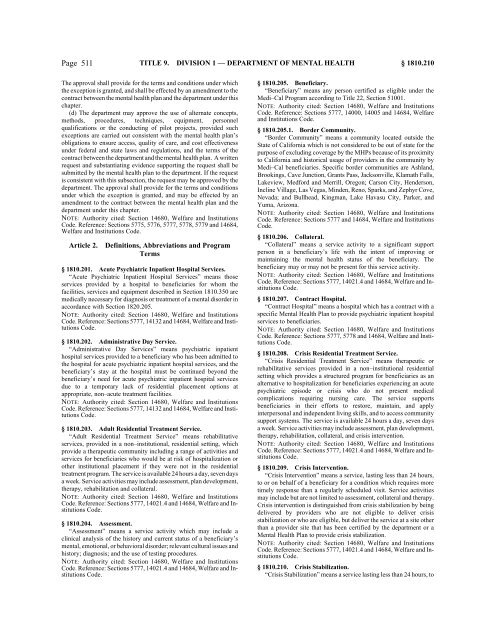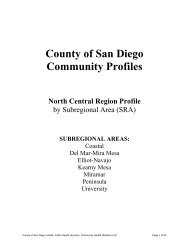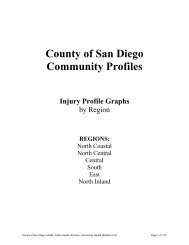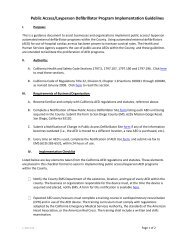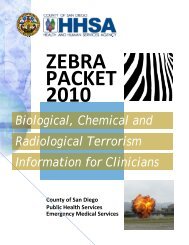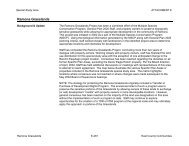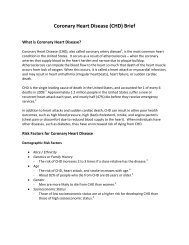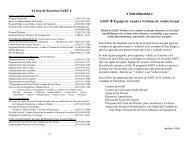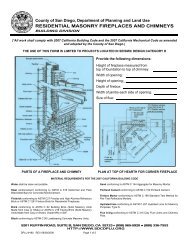CALIFORNIA CODE OF REGULATIONS - State of California
CALIFORNIA CODE OF REGULATIONS - State of California
CALIFORNIA CODE OF REGULATIONS - State of California
You also want an ePaper? Increase the reach of your titles
YUMPU automatically turns print PDFs into web optimized ePapers that Google loves.
Page 511<br />
TITLE 9. DIVISION 1 — DEPARTMENT <strong>OF</strong> MENTAL HEALTH § 1810.210<br />
The approval shall provide for the terms and conditions under which<br />
the exception is granted, and shall be effected by an amendment to the<br />
contract between the mental health plan and the department under this<br />
chapter.<br />
(d) The department may approve the use <strong>of</strong> alternate concepts,<br />
methods, procedures, techniques, equipment, personnel<br />
qualifications or the conducting <strong>of</strong> pilot projects, provided such<br />
exceptions are carried out consistent with the mental health plan’s<br />
obligations to ensure access, quality <strong>of</strong> care, and cost effectiveness<br />
under federal and state laws and regulations, and the terms <strong>of</strong> the<br />
contract between the department and the mental health plan. A written<br />
request and substantiating evidence supporting the request shall be<br />
submitted by the mental health plan to the department. If the request<br />
is consistent with this subsection, the request may be approved by the<br />
department. The approval shall provide for the terms and conditions<br />
under which the exception is granted, and may be effected by an<br />
amendment to the contract between the mental health plan and the<br />
department under this chapter.<br />
NOTE: Authority cited: Section 14680, Welfare and Institutions<br />
Code. Reference: Sections 5775, 5776, 5777, 5778, 5779 and 14684,<br />
Welfare and Institutions Code.<br />
Article 2.<br />
Definitions, Abbreviations and Program<br />
Terms<br />
§ 1810.201. Acute Psychiatric Inpatient Hospital Services.<br />
“Acute Psychiatric Inpatient Hospital Services” means those<br />
services provided by a hospital to beneficiaries for whom the<br />
facilities, services and equipment described in Section 1810.350 are<br />
medically necessary for diagnosis or treatment <strong>of</strong> a mental disorder in<br />
accordance with Section 1820.205.<br />
NOTE: Authority cited: Section 14680, Welfare and Institutions<br />
Code. Reference: Sections 5777, 14132 and 14684, Welfare and Institutions<br />
Code.<br />
§ 1810.202. Administrative Day Service.<br />
“Administrative Day Services” means psychiatric inpatient<br />
hospital services provided to a beneficiary who has been admitted to<br />
the hospital for acute psychiatric inpatient hospital services, and the<br />
beneficiary’s stay at the hospital must be continued beyond the<br />
beneficiary’s need for acute psychiatric inpatient hospital services<br />
due to a temporary lack <strong>of</strong> residential placement options at<br />
appropriate, non–acute treatment facilities.<br />
NOTE: Authority cited: Section 14680, Welfare and Institutions<br />
Code. Reference: Sections 5777, 14132 and 14684, Welfare and Institutions<br />
Code.<br />
§ 1810.203. Adult Residential Treatment Service.<br />
“Adult Residential Treatment Service” means rehabilitative<br />
services, provided in a non–institutional, residential setting, which<br />
provide a therapeutic community including a range <strong>of</strong> activities and<br />
services for beneficiaries who would be at risk <strong>of</strong> hospitalization or<br />
other institutional placement if they were not in the residential<br />
treatment program. The service is available 24 hours a day, seven days<br />
a week. Service activities may include assessment, plan development,<br />
therapy, rehabilitation and collateral.<br />
NOTE: Authority cited: Section 14680, Welfare and Institutions<br />
Code. Reference: Sections 5777, 14021.4 and 14684, Welfare and Institutions<br />
Code.<br />
§ 1810.204. Assessment.<br />
“Assessment” means a service activity which may include a<br />
clinical analysis <strong>of</strong> the history and current status <strong>of</strong> a beneficiary’s<br />
mental, emotional, or behavioral disorder; relevant cultural issues and<br />
history; diagnosis; and the use <strong>of</strong> testing procedures.<br />
NOTE: Authority cited: Section 14680, Welfare and Institutions<br />
Code. Reference: Sections 5777, 14021.4 and 14684, Welfare and Institutions<br />
Code.<br />
§ 1810.205. Beneficiary.<br />
“Beneficiary” means any person certified as eligible under the<br />
Medi–Cal Program according to Title 22, Section 51001.<br />
NOTE: Authority cited: Section 14680, Welfare and Institutions<br />
Code. Reference: Sections 5777, 14000, 14005 and 14684, Welfare<br />
and Institutions Code.<br />
§ 1810.205.1. Border Community.<br />
“Border Community” means a community located outside the<br />
<strong>State</strong> <strong>of</strong> <strong>California</strong> which is not considered to be out <strong>of</strong> state for the<br />
purpose <strong>of</strong> excluding coverage by the MHPs because <strong>of</strong> its proximity<br />
to <strong>California</strong> and historical usage <strong>of</strong> providers in the community by<br />
Medi–Cal beneficiaries. Specific border communities are Ashland,<br />
Brookings, Cave Junction, Grants Pass, Jacksonville, Klamath Falls,<br />
Lakeview, Medford and Merrill, Oregon; Carson City, Henderson,<br />
Incline Village, Las Vegas, Minden, Reno, Sparks, and Zephyr Cove,<br />
Nevada; and Bullhead, Kingman, Lake Havasu City, Parker, and<br />
Yuma, Arizona.<br />
NOTE: Authority cited: Section 14680, Welfare and Institutions<br />
Code. Reference: Sections 5777 and 14684, Welfare and Institutions<br />
Code.<br />
§ 1810.206. Collateral.<br />
“Collateral” means a service activity to a significant support<br />
person in a beneficiary’s life with the intent <strong>of</strong> improving or<br />
maintaining the mental health status <strong>of</strong> the beneficiary. The<br />
beneficiary may or may not be present for this service activity.<br />
NOTE: Authority cited: Section 14680, Welfare and Institutions<br />
Code. Reference: Sections 5777, 14021.4 and 14684, Welfare and Institutions<br />
Code.<br />
§ 1810.207. Contract Hospital.<br />
“Contract Hospital” means a hospital which has a contract with a<br />
specific Mental Health Plan to provide psychiatric inpatient hospital<br />
services to beneficiaries.<br />
NOTE: Authority cited: Section 14680, Welfare and Institutions<br />
Code. Reference: Sections 5777, 5778 and 14684, Welfare and Institutions<br />
Code.<br />
§ 1810.208. Crisis Residential Treatment Service.<br />
“Crisis Residential Treatment Service” means therapeutic or<br />
rehabilitative services provided in a non–institutional residential<br />
setting which provides a structured program for beneficiaries as an<br />
alternative to hospitalization for beneficiaries experiencing an acute<br />
psychiatric episode or crisis who do not present medical<br />
complications requiring nursing care. The service supports<br />
beneficiaries in their efforts to restore, maintain, and apply<br />
interpersonal and independent living skills, and to access community<br />
support systems. The service is available 24 hours a day, seven days<br />
a week. Service activities may include assessment, plan development,<br />
therapy, rehabilitation, collateral, and crisis intervention.<br />
NOTE: Authority cited: Section 14680, Welfare and Institutions<br />
Code. Reference: Sections 5777, 14021.4 and 14684, Welfare and Institutions<br />
Code.<br />
§ 1810.209. Crisis Intervention.<br />
“Crisis Intervention” means a service, lasting less than 24 hours,<br />
to or on behalf <strong>of</strong> a beneficiary for a condition which requires more<br />
timely response than a regularly scheduled visit. Service activities<br />
may include but are not limited to assessment, collateral and therapy.<br />
Crisis intervention is distinguished from crisis stabilization by being<br />
delivered by providers who are not eligible to deliver crisis<br />
stabilization or who are eligible, but deliver the service at a site other<br />
than a provider site that has been certified by the department or a<br />
Mental Health Plan to provide crisis stabilization.<br />
NOTE: Authority cited: Section 14680, Welfare and Institutions<br />
Code. Reference: Sections 5777, 14021.4 and 14684, Welfare and Institutions<br />
Code.<br />
§ 1810.210. Crisis Stabilization.<br />
“Crisis Stabilization” means a service lasting less than 24 hours, to


